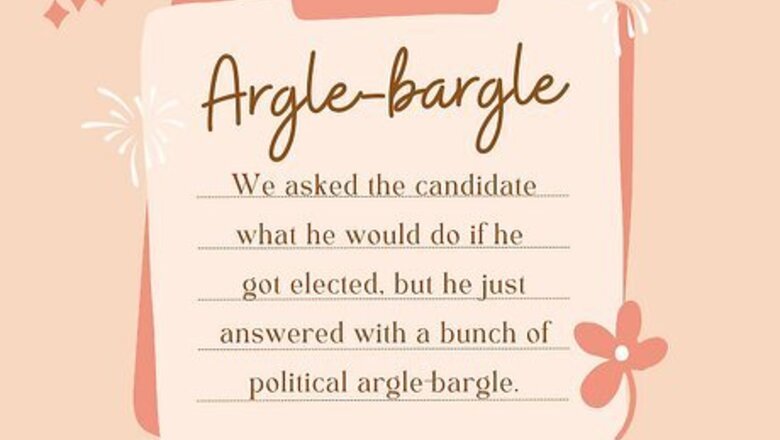
views
Argle-bargle
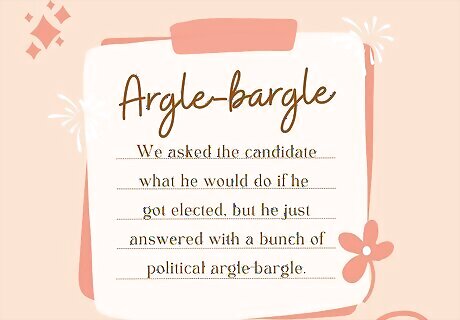
“Argle-bargle” basically means nonsense. This noun has been around since the 19th century, and it’s related to the Scottish term “argy-bargy,” which refers to a lively debate or dispute between people. In more modern contexts, it’s used to describe meaningless talk, or long-winded explanations that are actually confusing and nonsensical. For example: “We asked the candidate what he would do if he got elected, but he just answered with a bunch of political argle-bargle.”
Berserk
“Berserk” is an adverb that means frenzied or out of control. It comes from the Norse word berserker, which referred to ancient Scandinavian warriors who became crazed or deranged in battle, which led them to fight with enhanced strength. Now, the word “berserk” basically means losing one’s cool due to intense anger or excitement. “If my mom finds out that I skipped school today, she’s totally gonna go berserk.” “I waited my whole life to see Beyoncé in concert. When she got onstage, I went completely berserk.”
Bibble-babble
“Bibble-babble” refers to meaningless chatter. This noun basically means “idle talk” or “empty words.” It’s been around since the early 1600s, and many believe that William Shakespeare actually invented the term, since it appears in his play Twelfth Night. Here are some examples of how it’s used in a more modern context: “I thought our meeting would lead to some real solutions, but it was just a bunch of bibble-babble.” “I’m so tired of all the bibble-babble at these networking events. I hate meaningless small talk!”
Biblioklept
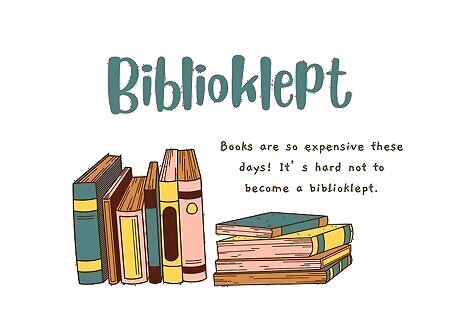
A “biblioklept” is someone who steals books. This word combines the prefix “biblio,” which comes from the Greek word for “book,” and “klept,” which comes from the Greek word that means “to steal.” It’s a bit longer and clunkier to say than “book thief,” but it’s also a lot more fun! “Books are so expensive these days! It’s hard not to become a biblioklept.”
Borborygmus
“Borborygmus” is the sound you hear when your stomach is grumbling. Technically, this noun refers to a rumble in your intestines caused by moving gas, and it’s actually the singular form of the word. If you wanted to refer to multiple rumbles, you’d say “borborygmi.” These words are a little long and complicated, but they also sort of sound like the actual sounds your stomach makes when you’re hungry, which is pretty fun. “It was dead quiet in the classroom while we took the test, but I was so starving. The whole class could hear my borborygmus.”
Brouhaha
A “brouhaha” is basically a big uproar about something. You might think this word is just a bunch of silly-sounding syllables strung together, but it actually dates back to the 18th century, and it comes directly from the French language. Now, this noun commonly refers to an overly excited, angry, or noisy reaction to something. Here are some examples: “His new novel caused a major brouhaha because he was accused of plagiarizing another writer’s work.” “There was a big brouhaha in the office when our boss announced that he wouldn’t be replacing the broken coffee maker.”
Bumbershoot
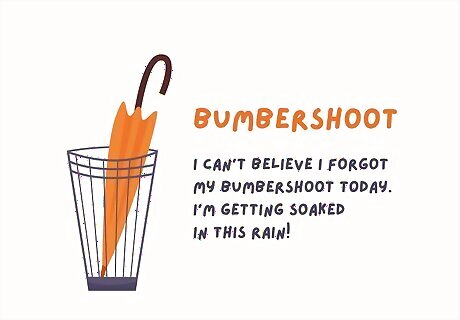
A “bumbershoot” is an umbrella. Yup, that’s really all there is to this wacky sounding word! It’s a direct synonym for “umbrella,” but it’s a lot more fun to say. If you really want to impress people with your unique vocabulary, let them know that you’ve got to grab your bumbershoot the next time it rains. “I can’t believe I forgot my bumbershoot today. I’m getting soaked in this rain!”
Bumfuzzle
The word “bumfuzzle” means to confuse or fluster someone. This verb originated in the U.S. around the 1870’s, and it’s thought to be a combination of the Scottish word bombaze, and the British word fuzzle which both mean to confuse. It may also be an alternate form of the more common word “bamboozle,” which has essentially the same meaning. “The test was so complicated that it managed to bumfuzzle even the most prepared students.” “I’m not very good with technology. I tried to fix my broken computer by myself, and I was totally bumfuzzled.”
Catawampus
“Catawampus” is an adjective that means something is going wrong. People usually use this term when a situation is awkward, going in the wrong direction, or veering off track. It can also describe an object that is askew or positioned strangely. You may also hear “cattywampus,” another variation of the word that has the same meaning. Here are some examples: “No matter how hard I try, I can’t get this picture frame to hang straight on the wall! It’s all cattywampus.” “I thought I was prepared for this week at school, but everything's going catawampus. I feel so disorganized and out of sorts.”
Chockablock
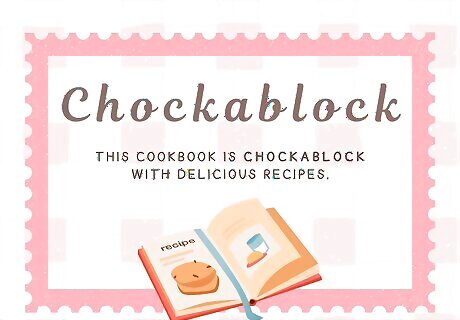
“Chockablock” means super full. This can refer to objects or ideas (“the shelves are chockablock with books” or “the manual is chockablock with information”), or people (“the theater was chockablock with audience members”). It essentially means packed, filled to the brim, or incredibly crowded. “This cookbook is chockablock with delicious recipes.”
Collywobbles
“Collywobbles” or “the collywobbles” are terms for tummy aches. They’re used to describe all kinds of stomach discomfort, including pain from a stomach bug or food poisoning, as well as queasiness due to anxiety or nervousness. The term dates back to the 1800s, and it started out as British slang. “My stomach is totally in knots about the test today. I’ve got a bad case of the collywobbles.” “Yikes, that meal gave me the collywobbles. There must have been something in it that didn’t agree with my stomach.”
Comeuppance
“Comeuppance” means getting the punishment one deserves. If someone is getting their “comeuppance,” they’re experiencing the natural consequences of their actions, and the world is giving them bad luck as a fair punishment for something they did. It’s basically cosmic payback. For example: “Don’t even worry about trying to take her down. When you act that badly, there’s bound to be consequences, so she’ll get her comeuppance one day.” “He got away with his bad behavior for years, but he finally got his comeuppance. Everyone found out that he was a liar and a cheat."
Conundrum
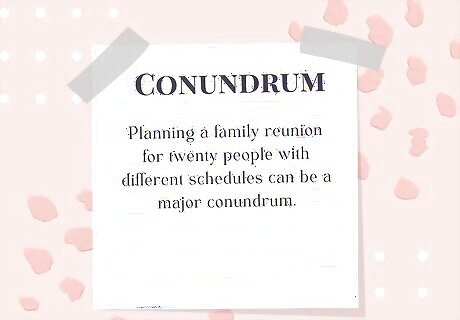
A “conundrum” is a confusing or difficult problem. This silly-sounding noun has been around since the 1600s, and although its exact origins are unknown, some people believe that it was created by students at Oxford University, who enjoyed word-play and puns. It still appears in modern conversations to describe intricate or seemingly unsolvable problems. For example: “Planning a family reunion for twenty people with different schedules can be a major conundrum.” “My best friend and my boyfriend don’t get along at all, but I want both of them to come to my birthday party, so I’m in a bit of a conundrum.”
Dawdle
To “dawdle” means to procrastinate or do something slowly. For example, if someone was supposed to be running errands, but they kept getting distracted and going into fun stores instead of getting things done, they would be dawdling. The exact origins of this verb are unknown, but it’s been in use since the mid 1600s. “Don’t dawdle on your way home from school! We have that important dinner to go to, so you need enough time to change and get ready.” “I had a mission to find my friend a birthday present at the mall, but I couldn’t help dawdling and going into all the fun stores to shop around.”
Doodlesack
“Doodlesack” is another word for bagpipes. You might think this British term is just a combination of silly sounds, but it actually comes from a real German word, dudelsack, which also means bagpipes. So, if you’re ever looking for a more unique way to refer to this instrument, consider opting for “doodlesack”! “The bagpipe, or the doodlesack, is a traditional Scottish wind instrument.”
Doozy
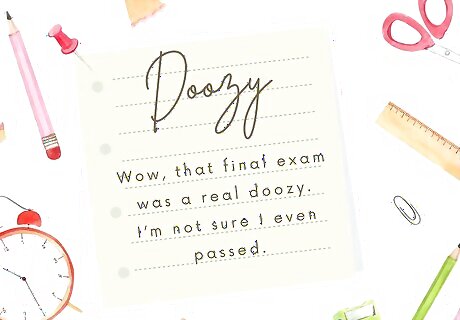
A doozy is something exceptional or unusual. This noun most commonly describes something that is unusually bad, like a freak snowstorm or super hard test. It’s also a slightly newer word compared to others on this list—its first recorded usage was in 1916. Here are some examples of how it’s used: “Wow, that final exam was a real doozy. I’m not sure I even passed.” “That car accident on the freeway was a doozy. No one was hurt, but it backed up traffic for miles.”
Fipple
A “fipple” is a mouthpiece on a recorder or similar wind instrument. This silly-sounding noun refers to the little endpiece at the tip of instruments like recorders or flutes that you blow into to make sound. You might not have a lot of reasons to use this word, but it’s definitely a fun one to say! “To play the recorder, a person must blow into a small mouthpiece called a fipple.”
Flibbertigibbet
A “flibbertigibbet” is a silly, flighty, or whimsical person. This noun comes from the Middle English word flepergebet, which referred to someone who gossiped or chattered a lot. Since then, the meaning of the word has evolved, and it now refers to someone who’s a bit unreliable, offbeat, or unserious. For example, in The Sound of Music, the nuns at the abbey refer to the free-spirited character Maria as a “flibbertigibbet” in the song “How Do You Solve a Problem Like Maria.” “I’ve encouraged her to be more practical and responsible, but she’s been acting like a flibbertigibbet lately.” “He’s a total flibbertigibbet. He really marches to the beat of his own drum, and you can’t count on him to be reliable about anything.”
Flub
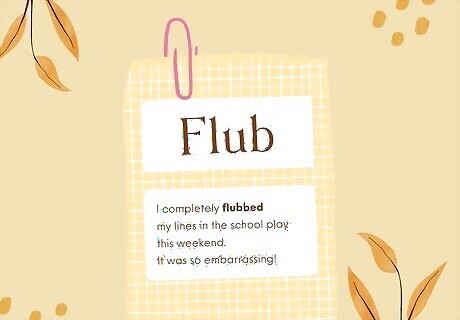
The word “flub” means to mess something up. It can be used as both a noun and a verb, and it basically means botching something or committing a silly blunder. For example, if you brought the wrong report to an important business meeting or messed up your lines while performing in a play, these would be examples of flubs. “I completely flubbed my lines in the school play this weekend. It was so embarrassing!” “Even though I practiced, I still mispronounced the investor’s name at the business meeting. It was such a major flub.”
Frippery
The noun “frippery” refers to frivolous or unnecessary things. The first known use of “frippery” was in 1568, which makes it one of the oldest words on this list. It comes from the Old French frepe, which means “old garment.” In modern contexts, it usually refers to showy or ostentatious things that are actually not important. For example: “I don’t have the time or money for fashion fripperies. I don’t need luxurious accessories or insanely expensive outfits that I’ll only wear once.” “I’m tired of the frippery at these parties. The champagne tower and chocolate fountain are way too ostentatious.”
Gobbledygook
“Gobbledygook” means overly complicated jargon. For example, an explanation that’s impossible to understand because it’s filled with technical terms and complicated language could be called “gobbledygook.” The first known use of this word was in 1944, so it’s definitely on the newer side compared to other words on this list. Here are some examples of how to use it: “I wanted him to explain the technology to me in simple terms, but he just rattled off a bunch of gobbledygook. It was completely unintelligible.” “We asked the politician for his stance on the issues, but his response was a bunch of gobbledygook. He tried to sound smart with a bunch of jargon, but it was all nonsense.”
Gubbins
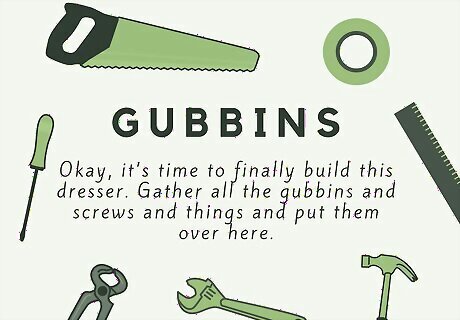
“Gubbins” means bits and pieces or paraphernalia. For example, all the random things in your junk drawer could be called “gubbins.” Or, you could say that you can’t change your tire because you don’t have all the “gubbins” (gadgets, tools, etc) needed to complete the task. In Great Britain, “gubbins” can also refer to a silly or foolish person. “Okay, it’s time to finally build this dresser. Gather all the gubbins and screws and things and put them over here.”
Highfalutin
“Highfalutin” means pretentious or overly fancy. If someone is “highfalutin,” they’re an overly pompous or self-important person, to the point that they appear silly or ridiculous. This adjective started out as a slang term in the U.S., and its first known usage was in 1839. Here are some examples: “He tried to sound smart with a bunch of highfalutin language, but he used a lot of it incorrectly, so he came off looking pretty ridiculous.” “The party was filled with highfalutin people trying to look important. They were all dressed to the nines, and they acted super pretentious.”
Hootenanny
A “hootenanny” is an informal gathering with singing and dancing. This term emerged in the U.S. in 1929, and it referred to impromptu parties where folk singers and musicians started playing to entertain people. “The party turned into a real hootenanny, with people bringing out their instruments and singers joining in for a spur-of-the-moment performance.”
Hullabaloo
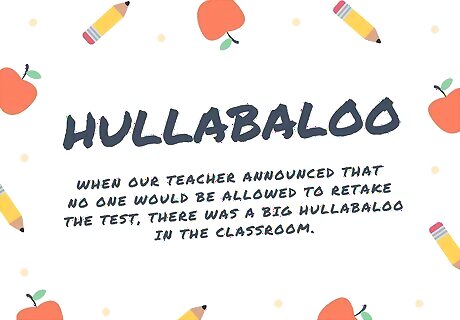
A “hullabaloo” is basically a big commotion. For example, if a politician made an unpopular announcement at a big speech and the audience started to react noisily and chaotically, that would be a “hullabaloo.” Here are some more examples of how to use this silly-sounding noun: “When our teacher announced that no one would be allowed to retake the test, there was a big hullabaloo in the classroom.” “The Academy Awards caused a big hullabaloo this weekend because a lot of people were upset about the snubs.”
Kerfuffle
A “kerfuffle” is a commotion, fuss, or argument. This noun may sound super silly and cute, but it actually refers to a noisy or chaotic disturbance, usually caused by a conflict. It evolved from the Scottish word fuffle, which means “to throw into disarray,” or to “ruffle someone’s feathers.” “Our school decided to implement uniforms, which caused a big kerfuffle. People started protesting right away and refused to comply with the new rule.” “A little kerfuffle broke out at our soccer match because one of the referees made a call that people disagreed with. There was a lot of yelling and shouting going on.”
Lackadaisical
“Lackadaisical” means unenthusiastic, lazy, or careless. This adjective usually refers to someone who isn’t putting a lot of effort into something, or who is lacking zest for life. The word actually has a pretty interesting origin story—when people had especially bad days in the 17th-19th centuries, they would cry out “lackaday!” to express their sadness and disappointment. Here are some examples of how “lackadaisical” is used today: “No matter what I do, I can’t get my students to care about their grades in this class. They’ve been super lackadaisical and unmotivated lately.” “She went through a sort of lackadaisical period recently. She was pretty unenthusiastic about everything and spent a lot of time just lazing around.”
Lollygagging
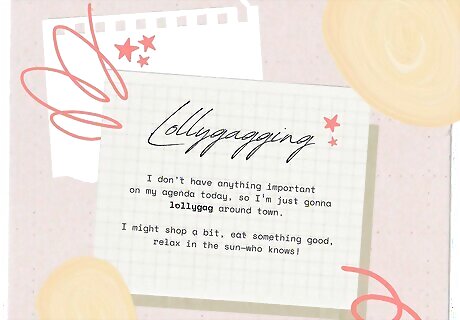
“Lollygagging” means fooling around or wasting time. This verb is basically a synonym for “dawdling,” and it’s been around since the 19th century. Besides being super fun to say, it’s also a pretty useful word to have in your vocabulary because it can apply to so many situations. For example: “I don’t have anything important on my agenda today, so I’m just gonna lollygag around town. I might shop a bit, eat something good, relax in the sun—who knows!” “Stop lollygagging and get to work! We’ve got too much to do right now, so there’s no time for chatting and fooling around.” “Don’t lollygag on your way home from school! You have a piano lesson at 4:00.”
Malarkey
“Malarkey” essentially means nonsense. It can refer to meaningless or insincere talk, or to silly behavior. For example, if you were calling someone out for a mistake they made and they responded with a bunch of silly excuses, you could say, “don’t give me that malarkey!” Here are some more examples: “I’ve tried to get him to stop believing in conspiracy theories, but he’s still obsessed with all that malarkey.” “Our boss tried to justify her decision at the staff meeting, but most of us thought it was a bunch of malarkey.”
Namby-pamby
“Namby-pamby” means weak or lacking in character. This adjective is usually used to describe someone who is indecisive, silly, unenthusiastic, or lacking in substance. It also has a pretty fun origin story: in the 18th century, poet Henry Carey came up with the nickname “namby-pamby” to refer to the poet Ambrose Philips because he thought Philips’ poems were childish and silly. The word stuck and officially became a part of the English language. “They think we’re just a bunch of namby-pamby failures, but we’re gonna show them that we’re serious about our poetry.”
Nincompoop
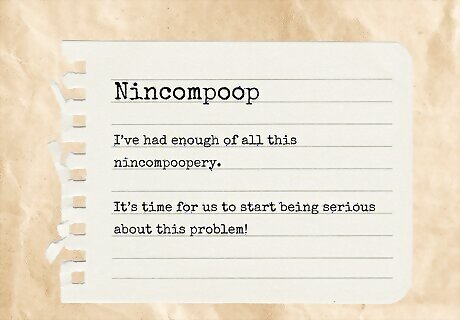
A “nincompoop” is an extremely foolish person. This word may be a not-so-nice insult, but it’s pretty fun to say. It refers to someone who is acting very silly or stupid, and it’s basically a synonym for the word “simpleton.” If you’d like, you can also use the verb form “nincompoopery” to refer to the foolish behavior itself, rather than the foolish person. Here are some examples of both in sentences: “The meeting was full of a bunch of nincompoops. None of them were acting rationally at all, and they were saying all sorts of silly things.” “I’ve had enough of all this nincompoopery. It’s time for us to start being serious about this problem!”
Oomph
“Oomph” means power, strength, energy, or charm. The noun “oomph” is a little hard to explain, but it basically means that special extra something. For example, if you were giving feedback on someone’s essay, you could say, “It’s good, but it needs a little oomph.” Here are some more examples: “He was qualified for the job, but he just didn’t have that special oomph to convince people to vote for him.” “That rehearsal was solid, but I know we can do better. Let’s do it one more time with a bit more oomph.” “If you want the movie to succeed, you need to cast someone with a lot of oomph.”
Pandiculation
“Pandiculation” is the word for those stretches you do when you wake up. This noun is actually the official medical term for the stretching, stiffening, and yawning humans and animals do when they’re drowsy or waking up from sleep. It’s kind of a mouthful to say, but it’s a good word to know if you want to impress people with a unique word for a common experience. “You’ve probably seen your dog yawning and stretching in a specific way when they wake up from naps. This is called pandiculation, and it’s an involuntary response that humans experience, too.”
Pauciloquent
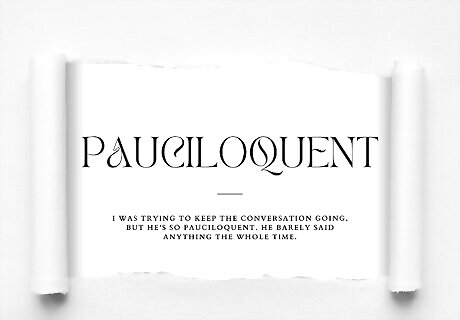
A “pauciloquent” person is someone who isn’t that talkative. For example, if you know someone who doesn’t really chime in that much during conversations, you could describe them as “pauciloquent.” This is way fancier than just saying that someone is a person of few words! Here are some examples: “I was trying to keep the conversation going, but he’s so pauciloquent. He barely said anything the whole time.” “She’s been kind of pauciloquent lately. She used to be super talkative, but she’s been really quiet over the past few months.”
Poppycock
Like many other words on this list, “poppycock” means nonsense. For example, you could say that something is “poppycock” if it’s silly, useless, meaningless, or untrue. This word is pretty fun to say, so it’s a good idea to add it to your arsenal! Here are some examples of how to use it: “She accused him of cheating on the test, but he said this allegation was absolute poppycock.” “I used to trust everything politicians said, but I know better now. I’m not listening to all that poppycock.” “There’s a lot of gossip going around, so let me set the record straight–it’s all complete poppycock!”
Ragtag
“Ragtag” means ragged or unkempt. This adjective is usually used to describe a group of people who are disorganized or untidy, and it can also refer to a strange group made up of people you wouldn’t expect to work together. For example: “The movie Guardians of the Galaxy is about a ragtag group of misfits who come together to save the universe.” “There are lots of books about ragtag groups of unlikely friends coming together to complete a mission.”
Sialoquent
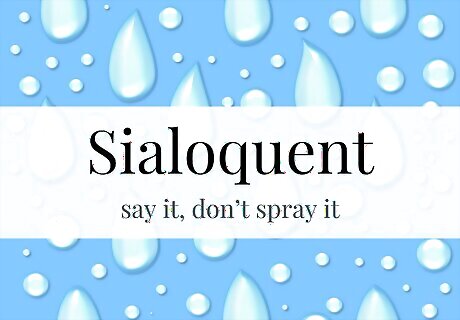
If someone is “sialoquent,” they tend to spit when they speak. You’ve probably never heard of this word before, but it’s actually been around since the 17th century. The adjective refers to someone who sprays saliva while talking, which is pretty gross (but also pretty common). So, rather than saying “say it, don’t spray it” the next time someone is spitting while talking, consider saying “stop being so sialoquent” instead!
Squabble
A “squabble” is a noisy disagreement, usually over something small. This noun has been around since at least the early 1600s, and it likely comes from the Swedish word skvabbel, which means to quarrel or gossip. Here are a few examples of how to use it in conversation: “I wanted to be mature, but I ended up getting into a petty squabble with my siblings over which room each of us would get in the AirBnB.” “She and I really don’t get along. We got into stupid squabbles about silly things all day.”
Verklempt
The adjective “verklempt” means overcome with emotion. For example, if someone was reuniting with friends they hadn’t seen in years and they got super choked up about it, you could say they were “verklempt.” Here are some more examples: “The other day I was cleaning out my closet and I was totally verklempt over a bunch of old birthday cards from my grandparents that I found.” “I tried not to be too sentimental, but I was totally verklempt when we watched those old home videos on Christmas last year.”
Whiffler
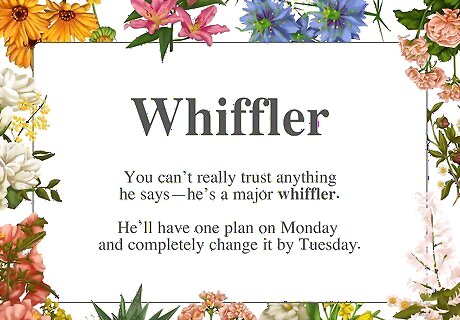
A whiffler is someone who frequently changes their opinion or their plan. This noun describes a person who is shifty or unreliable, to the point that it seems like they’re always changing their mind or shifting their course. For example: “You can’t really trust anything he says—he’s a major whiffler. He’ll have one plan on Monday and completely change it by Tuesday.”
Woebegone
The adjective “woebegone” means sorrowful or miserable. It comes from the Middle English phrase wo begon, which means beset with woe. For example, if you see someone looking super sad or dejected, you could describe them as “woebegone.” Here are some more examples: “When she didn’t get the lead role in the play, she spent the rest of the day wallowing in her disappointment and wearing a woebegone expression.” “After losing the game, the football team looked like the most woebegone group of people I’d ever seen.”
Zonk
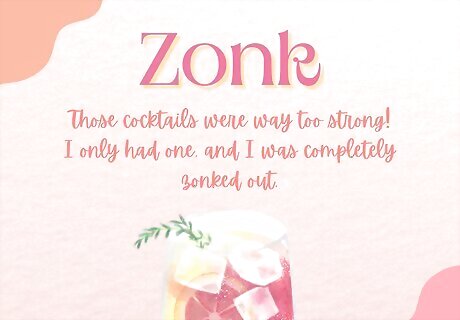
To be “zonked” means to be stunned, stupefied, or hit by a blow. The word basically means that you’ve been completely incapacitated or stupefied by something. For example, if you accidentally got hit in the head during a sports game, you could say you got “zonked.” Or, if you accidentally drank too much alcohol and passed out early, you could say you “zonked out.” Here a few example sentences: “I accidentally got zonked in the head by someone’s elbow while we were playing soccer.” “Those cocktails were way too strong! I only had one, and I was completely zonked out.”














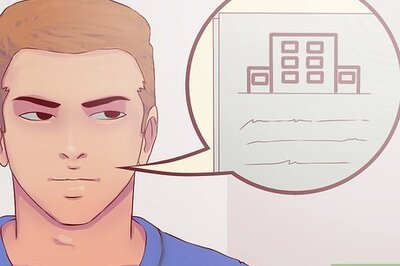





Comments
0 comment